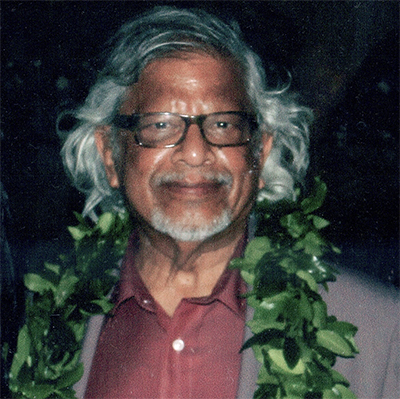
Summary:
Peace walks Barefoot.
A Meeting of East and West
In the spring of 2011, a quiet evening in Honolulu became the setting for an extraordinary convergence: Arun Gandhi, grandson of Mahatma Gandhi; Dr. Maya Soetoro, sister of U.S. President Barack Obama; and Zhou Xiaofang, grand-niece of Chinese Premier Zhou Enlai, met unofficially, as kindred spirits—drawn together by shared ancestry and a longing for peace.
In “Dinner with Arun Gandhi,” Xiaofang offers a firsthand account of this intimate gathering. Woven through gentle conversation, soulful memory, and cross-cultural reflection, Arun Gandhi’s stories—especially of his father’s silent lessons and his grandfather’s unwavering commitment to nonviolence—unfold as a quiet revolution in understanding.
This narrative invites us to see peace as a personal discipline, greater than policy; as a daily vow, greater than a destination. Through warm recollections and enduring wisdom, it plants this thought in each reader’s heart:
“Peace doesn’t need to win the whole world, all at once.
It only needs to win the next moment, in this heart and the next.”
It was early spring, 2011; a tranquil evening in Honolulu.
The Hawaiian air carried a gentle humidity, infused with the scent of the Pacific breeze, weaving through eaves and palm fronds.
The sunset had long faded, and a soft glow bathed the wooden round table. We gathered in a spacious and warm family dining room, each of us harboring an indescribable anticipation — for we knew this was no ordinary dinner.
That night, I met Arun Gandhi, the grandson of Mahatma Gandhi, for the first time.
As he stepped into the courtyard, all eyes turned to him. He exuded a radiant presence; his brown face bore a slight smile, framed by semi-curly silver-black hair and a pair of black-rimmed glasses that accentuated his scholarly demeanor.
Without an entourage or an imposing aura, he wore a gray suit over a pink shirt, complemented by brown leather shoes. Around his neck hung a lei of green leaves and white jasmine petals, symbolizing Hawaiian hospitality. He resembled a revered elder — approachable and dignified.
He greeted each guest with a handshake.
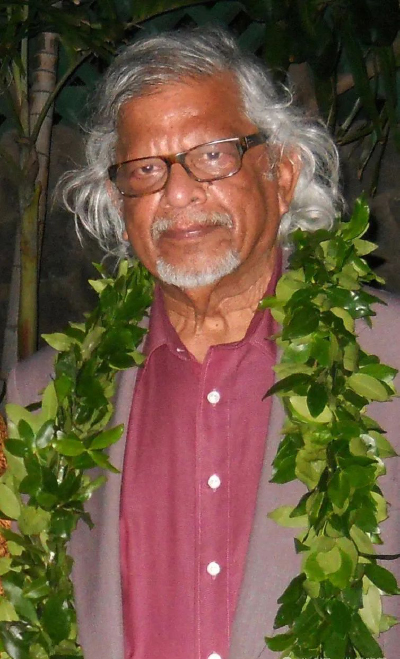
At that moment, Maya entered the courtyard. Though we had heard of each other, it was our first meeting. We exchanged smiles, and the photographer quickly captured a historic moment of Arun, Maya, and me together.
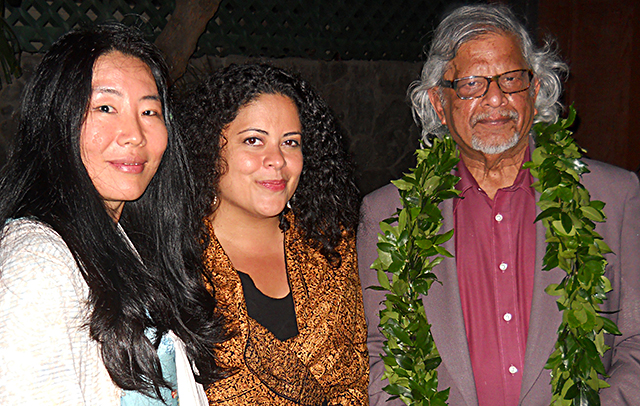
A significant moment — here were close relatives of the leaders of India, China and America, gathered to reflect privately on the world, and on peace:
Arun Gandhi, grandson of Mahatma Gandhi, who was called “Father of the Nation” of modern India; Dr. Maya Soetoro, sister of Barack Obama, president of the United States at the time; and myself, grand-niece of Zhou Enlai, the first Premier of modern China. Together, we represented more than 40% of the population of the globe, and the best hope for peace for billions.
Tonight, we were just three ordinary people, gathered with a group of friends to enjoy the evening.
The dinner dishes were personally prepared by the Wattamulls — a prominent Honolulu family, active in real estate, retail, community affairs and the large community of people from India. The mutual friend who introduced us, and hosted us at this dinner, was Robin Rohr, best-selling author.
It was a simple yet hearty Indian meal featuring fruit salad, vegetarian curry, samosas, fresh seafood, Indian flatbread with mango chutney, and fresh coconut water. As we savored the cuisine, we conversed like a large family, sharing stories about education, culture, faith, and the meaning of peace across cultures.
Maya sat to my left. She wore a black long dress with a golden shawl, her black curly hair and loving eyes reflecting a blend of Eastern and Western beauty and warmth — both reserved and passionate. Her voice resonated with familiar echoes of her famous brother.
That evening there were no ceremonies, no cameras, no social media distractions. Just a few people around a table, sharing food, memories, and a shared longing for a better world.
I still remember Arun’s words: “Peace is not something you achieve in politics; it begins with how you treat a child, a stranger, even your own anger.”
That sentence ignited a deep, unnamed desire within me. I began to realize that perhaps my role wasn’t to rewrite history, but to preserve the stories yet to be told.
When Arun spoke of his grandfather, his tone was like a child, recalling an elder who once handed him a glass of milk in the kitchen, rather than the legendary figure who altered the course of 20th-century history.
“Many people ask me if being Gandhi’s grandson is an honor,” he said with a slight smile. “Actually, for a long time it felt like a burden.”
This candid and genuine expression caught me off guard.
He explained that his childhood wasn’t bathed in glory. Instead, he often felt the scrutinizing gaze of others — expecting him to become “another Mahatma.” Those expectations made it hard for him to breathe. He made mistakes, rebelled, and did things contrary to the philosophy of non-violence, just like any growing boy.
“But the problem was, I didn’t have the privilege of ‘just being a boy’ — he paused. “Because my grandfather was Mahatma Gandhi.”
Mohandas Karamchand Gandhi was the soul of India’s independence movement. Through the philosophy of Satyagraha — nonviolent resistance — he led millions to challenge colonial rule, winning freedom without bloodshed or hatred. His ideals changed the world.
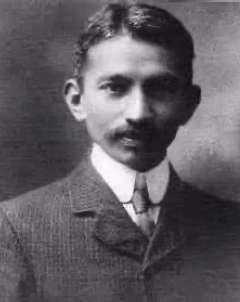
For Arun, this was more than history; it was a family legacy — a heavy key to carry.
“You know, the first time I visited my grandfather’s place, he just handed me a broom.”
“He said, ‘Clean the ground beneath your feet before talking about the world.’”
“Peace isn’t about speeches; it’s about doing things right.”
At the time, Arun was confused and dissatisfied. Years later, he understood that his grandfather’s teachings were never about telling him “what to do,” but guiding him to see “what had to be done.”
“My grandfather didn’t teach me how to speak; he taught me how to live.”
As he said this, he gently tapped the table, as if striking a silent bell. His voice was soft, yet it resonated within me.
He spoke of his father, Gandhi’s son — a quiet and stern man who inherited Gandhi’s discipline. His father’s expectations weren’t for Arun to become a great man, but to become himself.
I thought of my own family. My father once told me that Premier Zhou Enlai sent a red envelope with four small bills inside when I was born, as a blessing — a gesture that, though he couldn’t meet me in person, became an invisible bond to him that I have felt throughout my life.
We inherit many things from our elders — both light and shadow.
As Arun said:
“It’s not the legacy you’re born into that matters.
It’s the way you choose to carry it forward.”
At that moment, I no longer saw him as Gandhi’s grandson. He was a real person — someone who learned to walk under a heavy burden, someone who sought peace amid contradiction.
He helped me understand that peace isn’t a saint’s maxim, but how we live, between the cracks of the world.
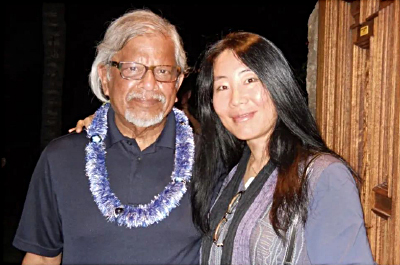
Arun Gandhi with author Xiaofang Zhou, March 8, 2011. At the studio of Paul Chesley, Diamond Head, Honolulu; for National Geographic.
As the dinner lights softened, Arun’s voice grew deeper.
“Many people ask how Gandhi influenced me. Actually, the event that changed my life wasn’t a quote from my grandfather but a decision my father made.”
As he spoke, I saw a glimmer of moisture in his eyes. He seemed to return to that scorching Indian afternoon — a teenager intoxicated by the freedom of adventure, unaware that the next few hours would alter his life forever.
At seventeen, Arun secretly took his father’s car keys, wanting to feel the city’s pulse, the streets’ bustle, and the recklessness of youth — like any teenager. He didn’t expect that this act of indulgence would lead to a profound lesson in silent education.
The next morning, he woke to find his father absent and the car untouched. He thought he had gotten away with it. But his father didn’t return all day.
That evening, his father walked in, steady and calm, without anger or blame.
Arun explained — “He walked nearly thirty kilometers to work and back that day.”
“No scolding, no accusing glances. He said he couldn’t use the car anymore — because he hadn’t taught his child well.”
At that moment, Arun choked up. He felt as if an invisible knife had cut through his heart — not because he was scolded, but because he wasn’t.
“I would have preferred him to yell at me; at least then I could argue and preserve my dignity.”
“But he said nothing, choosing instead to use his own steps to engrave this incident into my heart.”
After that night, Arun never took the car without permission again. He said that was the first time he truly understood what responsibility meant.
“He didn’t punish me.
He reflected the responsibility back to himself.
And that shattered me in the most transformative way.”
He said this wasn’t just a simple family discipline but a true lesson in nonviolent education.
“Nonviolence isn’t about suppressing emotions; it’s about using actions to remind others that introspection is more powerful than external control.”
“Peaceful parenting, like peaceful activism, isn’t weak — it’s courageous.”
This was his father’s way of teaching. It was also the consistent belief of the Gandhi family: you can’t educate others with words alone; you must educate yourself through action.
And the highest form of education isn’t punishment but self-accountability.
That night, we sat in the living room, each silently digesting the impact of the story. Outside, the sea breeze gently brushed against the windowpanes, as if time itself sighed.
I thought: perhaps this is the true source of peace. Not a grand avenue, but a choice — time and again in human relationships, choosing to replace words with footsteps, introspection with anger.
It was a profound gentleness and a reflective strength.
After the dinner, Mrs. Watamull, taking everyone’s suggestion, invited Arun to give a lesson to the guests. We were already immersed in Arun’s stories, as if sitting around a hearth, listening to him rekindle the embers of Gandhi’s spirit.
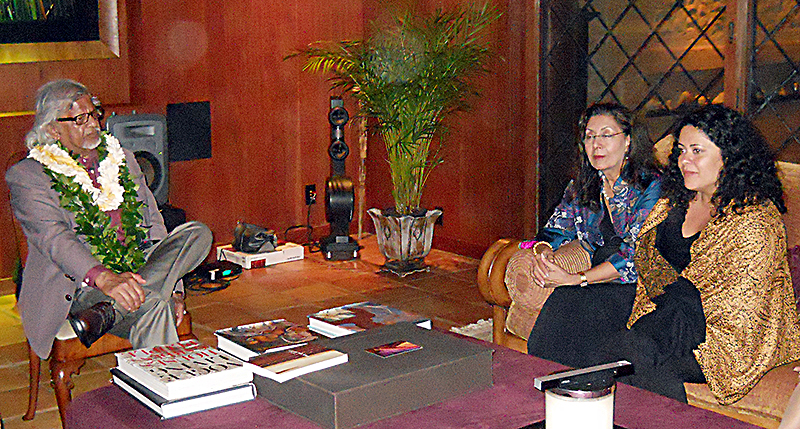
After sharing his father’s story, the living room fell silent for a moment.
“Mr. Arun,” Maya asked softly with her deep eyes, “in your view, what is the true root of peace?”
He looked back at Maya, nodded gently, and said, “That’s a good question. Too many people think peace is the signing of diplomatic documents or the end of conflict. But actually —
He paused, “Peace isn’t an agreement. It’s how we choose to view humanity.”
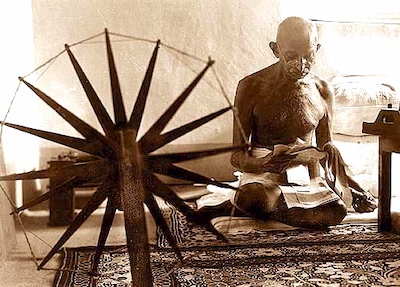
He continued, “My grandfather often said, “Be the change you wish to see in the world.’ But this sentence is often misunderstood as a kind of positive thinking. In fact, it is a painful demand.”
Someone asked, “Painful? Why?”
He replied, “Because it means you must face the part of the world you dislike — in yourself.”
“You can’t just demand world peace while being quick to anger, indifferent, or hurtful in your own life.”
I was stunned. He was right.
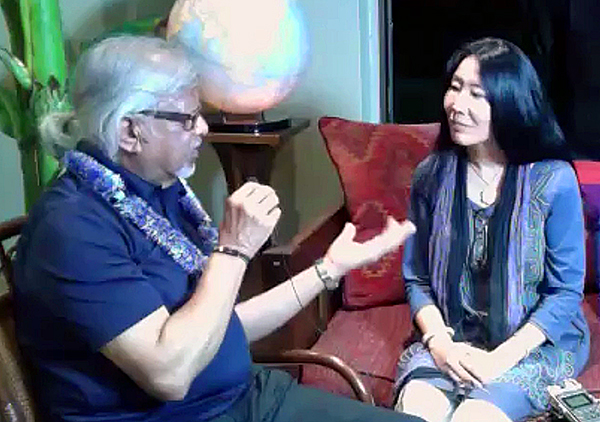
We often call for peace in public, but lose patience with our children at home; we praise diversity in speeches but harbor prejudice against strangers in daily life.
Arun said, “My grandfather advocated nonviolence throughout his life, but he said the real enemy of nonviolence is inner violence — disdain for others, indulgence in oneself, and indifference to the world.”
He shared another story: one year, an Indian businessman asked Gandhi, “If the British suppress you with force, will you continue nonviolence?”
Gandhi replied, “I’m not nonviolent because I trust the British but because I believe in the hope of humanity.”
That sentence, “I believe in humanity,” deeply moved me.
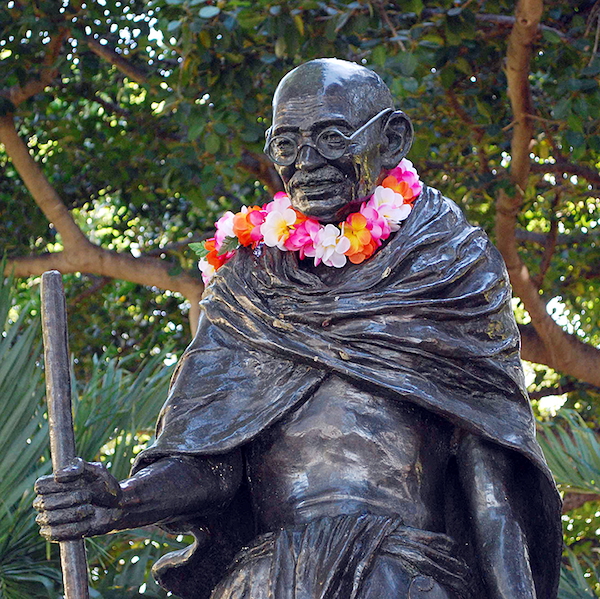
Bronze commemorative figure of Mahatma Gandhi; Kapiolani Park, Honolulu
In today’s world, saying this almost seems naively extravagant. But Arun’s eyes told me his grandfather wasn’t naive; he chose to believe in the power of good, even while fully aware of human evil.
I couldn’t help but ask him, “Do you still believe? After humanity has experienced so much war, division, and hatred?”
He looked at me and nodded.
“I’m not a naive optimist,” he said, “but I believe that every time we choose not to hate, it’s a small victory for peace.”
“Peace doesn’t need to win the whole world, all at once. It only needs to win the next moment, in this heart and the next.”
He said this so softly it seemed the evening breeze might carry it away. But it landed in me like a seed, beginning to take root.
Peace has no banners. It walks barefoot.
It arrives not with applause, but with quiet moments: a father choosing silence over anger; a son learning accountability instead of rebellion; a grandson telling stories not to glorify a legacy, but to pass its lessons forward.
Before we parted ways that evening, I asked Arun one final question.
“You come from India and now live in the United States. I come from China and now also live in the United States. As citizens of the two largest nations on earth, what do you believe is the most important aspect of the relationship between China and America?”
He paused, then looked me squarely in the eyes with both conviction and kindness.
“This world is shrinking. It no longer matters so much where we come from. I believe no nation can remain powerful alone, or stand apart forever. What matters is this: finding common ground in our differences. Learning to coexist, to cooperate, to build peace together. That is how we make life better for all people on this earth.”
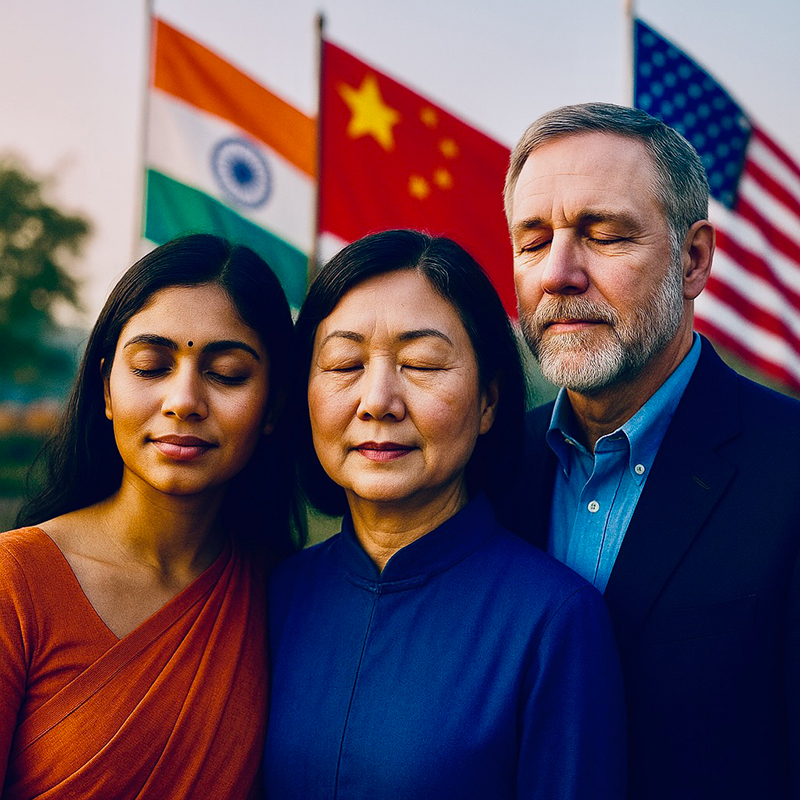
I was deeply moved. Here was a man who had walked between cultures, legacies, and continents, and distilled it all into one simple truth: peace is not imposed — it is lived.
As we said goodbye, I felt something shift in me — not a dramatic revelation, but a quiet clarity. A reminder that peace is not a destination, but a discipline. Not a final achievement, but a daily choice.
In that choice, we become the continuation of every gentle step walked before us — from Gandhi, to his son, to Arun — and perhaps, one day, to someone listening quietly at a dinner table, allowing a story to become a seed.
June 8, 2025
Zhou Xiaofang
co-founder, Zhou Enlai Peace Institute
Download (PDF)
Dinner with Arun Gandhi


